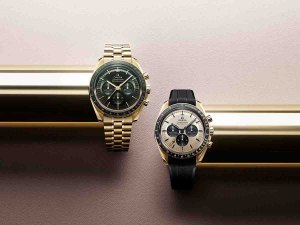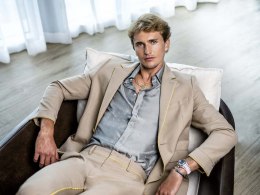Alexander Zverev’s 2022 Goal: Global Domination

WATCH: Rolex
Photo Credit: Nick Garcia
ALEXANDER ZVEREV IS KICKING OFF 2022 AS THE WORLD’S NO. 3 TENNIS PLAYER. AND AFTER SCORING OLYMPIC GOLD, HE DOESN’T PLAN ON STOPPING THERE.
BY LAURA SCHREFFLER
PHOTOGRAPHY NICK GARCIA
STYLING ADRIENNE FAUROTE
GROOMING LESLIE MUNSELL
SHOT ON LOCATION AT
THE KIMPTON EPIC PENTHOUSE
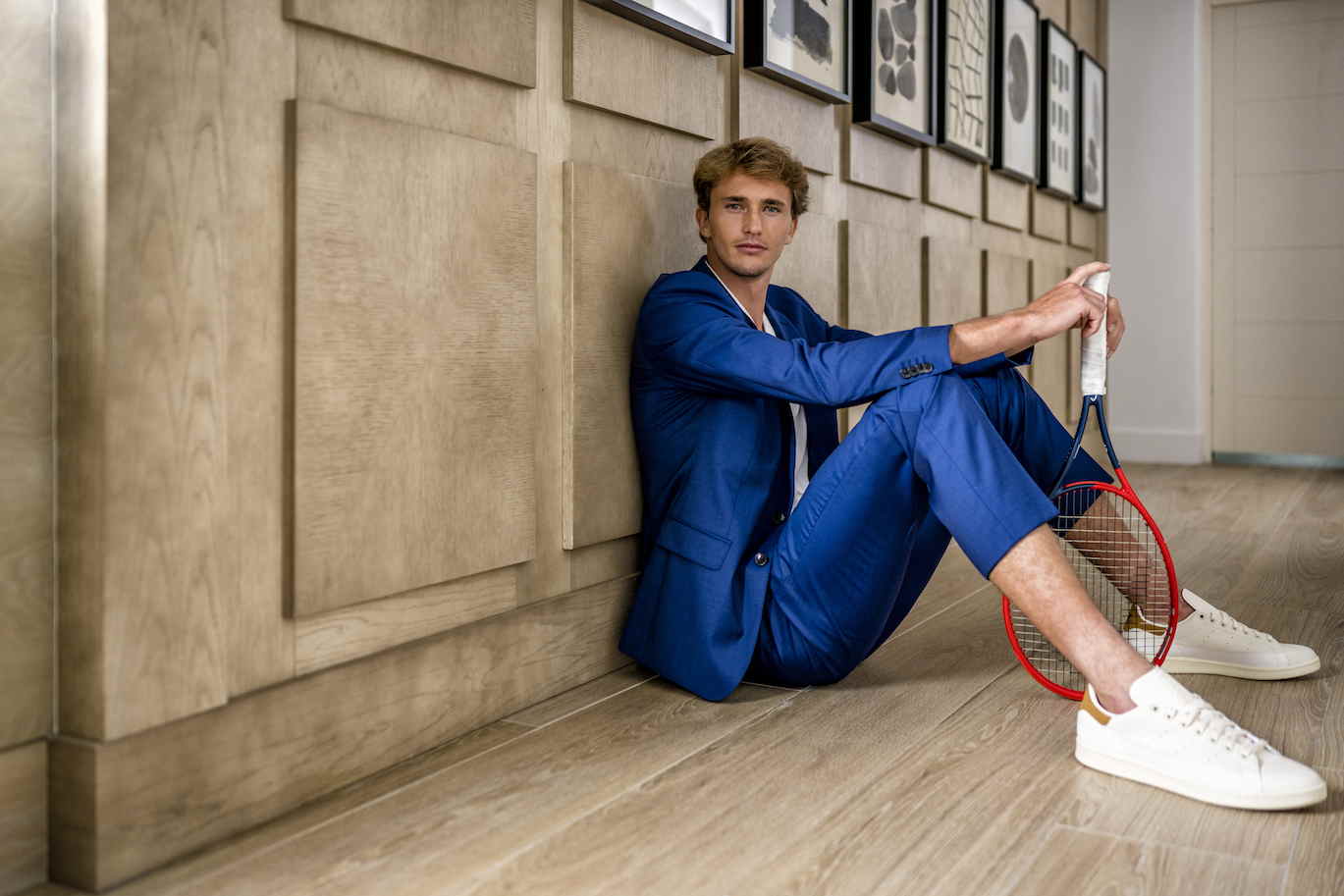
PANTS + SHIRT: BOSS
WATCH: Rolex
SHOES: Adidas
Photo Credit: Nick Garcia
Let me issue you a challenge. Go ahead, tell Alexander Zverev he can’t do something. I defy you, and so will he: He’ll go to many (though not any) lengths to prove you wrong.
The 24-year-old German-born, Monaco-residing tennis pro and I are doing the Zoom thing days after the Nitto ATP Finals, his sixth and final tournament of the year, where he bested world No. 2 Danil Medvedev to become world No. 3. He’s been lounging languidly in his Dubai hotel room, his 6-foot-6-inch frame poured liberally and liquidly into a tiny chair, but sits upright when discussing how defying the odds fuels his fire.
“I love to prove people wrong, and I have to prove them wrong immediately, no matter who they are or what they tell me I can’t do… on realistic terms,” he declares. An addendum: “If they tell me I can’t jump from a skyscraper and survive, I’ll tell them, ‘Yeah, you’re right.’ But if I can do it, I want to prove it. I’m very black and white; I don’t have any gray zones.”
He continues, “I have been told many times in my life that I would not achieve what I’ve achieved, that I would not succeed in sports.” [Oh, you foolish people!] “Obviously, I love when I play in Germany and 20,000 fans are cheering for me and I’m the crowd favorite, but I also really appreciate when the crowd in a stadium doesn’t like me. I really do enjoy the moments where I’m alone against the world.”
Zverev has a youthful machismo, almost an arrogance, that envelops him like a cloud. It’s refreshing to see someone with such confidence, who still manages to be quite self-aware. Some don’t bounce back from defeat; Zverev simply doesn’t accept it. Even when he gets knocked down, he gets back up again very, very easily.
“I’m actually someone with the luck of having a short-term memory. I can forget quickly, which is a good thing, because whether you’re winning or losing in tennis, there’s always next week,” he says. “You always have the next opportunity; there’s always another match in the near future. It’s very important to have that mindset.”
Not that he’s done much losing this year, mind you. In addition to becoming world No. 3, he beat No. 1-ranked player Novak Djokovic to take home Olympic gold (and snapped what was a 16-match win streak after taking Djokovic to five sets in a US Open semifinal for the record books); won the Western & Southern Open; led Team Europe to a championship at the Laver Cup; and won the Vienna Open, clinching his 300th tour-level victory, among other accolades.
To be fair, “Sascha,” who has been playing since he was 5 years old, has been a top 10-ranked player since 2017, but it wasn’t until 2021 that his star began to achieve such a serious level of success, that would put him in contention with the Big Four: Djokovic, Roger Federer, Rafael Nadal, and Andy Murray. Incidentally, he’s the only active player outside of these greats with five ATP Masters 1000 titles. One has to wonder what he did differently and how he defied his perceived odds. For his part, Zverev simply credits his success to experience [and to superstitions like fist-pumping everyone on his team and kissing his two toy poodles, Loevick and Junior, on their foreheads]. “There are things I’m starting to learn, past mistakes I’m starting to realize, knowing how to act in different situations,” he says. “For the last six months, everything just came together, in a way. I was playing amazing tennis, but I was enjoying myself on and off the court. I was having a great time, and I think when you’re truly enjoying the things that you’re doing, everything comes easier. Everything is more natural.”
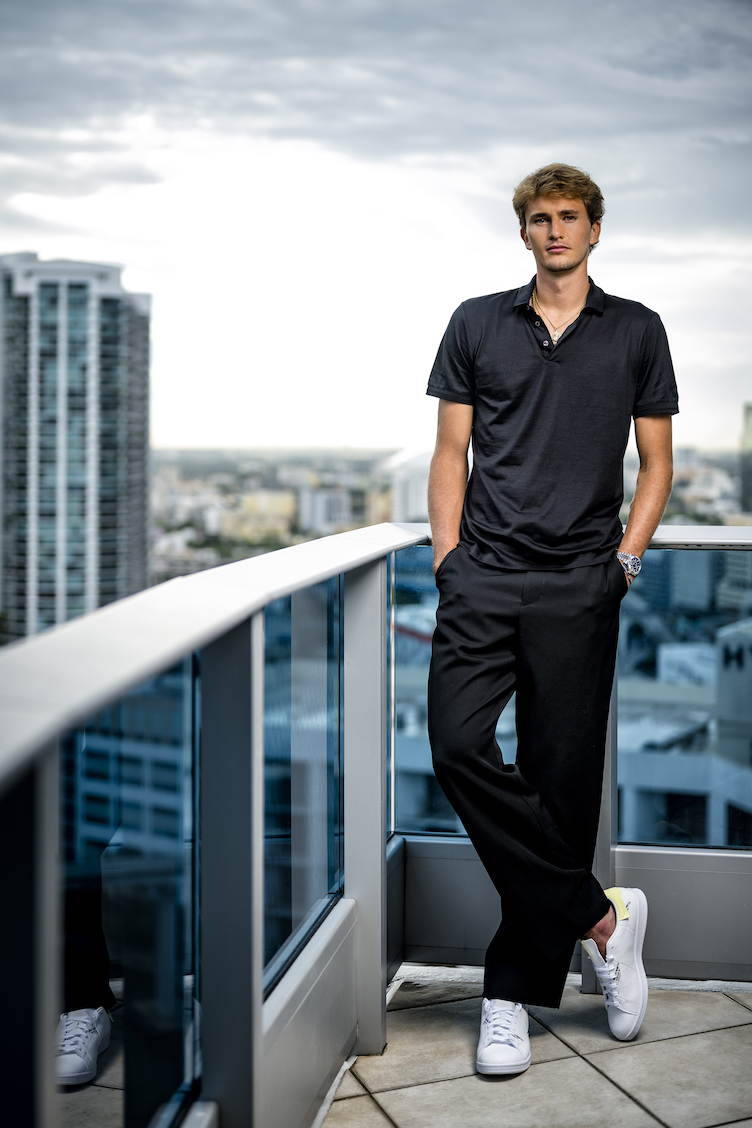
PANTS: Prada
WATCH: Rolex
SHOES: Adidas
Photo Credit: Nick Garcia
He continues, “I’ve always enjoyed being a tennis player, traveling around and playing in the biggest stadiums in the world. But obviously, when you’re a top player, you need to learn how to deal with that pressure and to start enjoying that part as well, because at the end of the day, the people that are on top have pressure for a reason. They’re expected to win. And once you do, you’ve got to not just talk the talk — you’ve also got to walk the walk. There’s a thin line between putting too much pressure on yourself and enjoying the moment.”
For now, with more than a month between his last event of 2021 and the first of 2022, the ATP Cup at Sydney Olympic Park in Australia on New Year’s Day, he’s truly living in the moment, reveling in his superstar status. “It feels great, but I don’t want to stop there!” he declares. “I’m world No. 3. I know that I still have a lot of goals ahead of me, and I’m looking forward to those because I don’t feel like I’ve achieved everything I wanted to. I mean, I won six tournaments. I won two ATP 500s, two Masters 1000s, I won the Olympics, I won the ATP Finals. So it’s been a great year, but it can still be better.”
His plan for global first-seeded domination is simple: Keep on trucking. His system has been working so far, he rationalizes, so why fix it? “I’m on a good path, so I think I’m going to keep things similar. I started [2021] at No. 7 and I climbed up to No. 3. Success does take time.”
But even in his wildest dreams (OK, maybe that’s a lie) could he imagine the result of the 2020 Olympics. Not only did he become the first German male to ever win gold in men’s singles, but he was the first German to win singles gold at all since Steffi Graf took home that medal in 1988, and created a major upset by besting friend and world No. 1 Novak Djokovic.
He still marvels at this today, but remembers the moment as being bittersweet despite the enormity of his win. “It was emotional for both of us. I knew that I had secured a medal for Germany, which was a dream come true. And at the time, I was down. I was playing Novak, who had barely lost a match that year and who, up until that moment, had won all three Grand Slams. When I won, everything kind of came out of me. I started crying; I was very emotional. But for him, the only thing he hasn’t won in his career is the Olympics. He basically has every single record there is to have and has won every single thing except an Olympic gold medal. So in that moment [when I could have been screaming and ecstatic because it’s “the most important trophy that any sports person can have”] I tried to comfort him, to be honest.”
That’s just Zverev. He describes himself as someone who doesn’t have many friends intentionally, but those that he does have, he has for life and would lay down his life for. Or suppress a victory dance for, as it were. “I am someone that has a very small, but very close friend group,” he says. “I would literally jump into fire to save those people, but it takes time for me to get to that level. I’m not somebody that has 150 contacts on my phone. I have very few people that mean the world to me, and I like to keep a small circle.”
In the ATP universe, that close-knit crew includes Djokovic, as well as Russian Andrey Rublev, a friend of 14 years, and Austrian Dominic Thiem. I have to wonder, especially in the former case, how does he manage to separate on-court rivalry and real-life friendship? How does he draw the line?
“Me and Novak, obviously we are two of the top three players in the world. We know that we can go out on the court and try to beat each other for four or five hours like we did in New York and Australia [in 2021]. After the match, we’ll hug each other and everything will be fine, because that’s the kind of relationship that you need. If you can’t separate the two, it’s very difficult to have a relationship on the tour.”
He confides that he was once close with Roger Federer, though their mentor-student relationship fizzled a bit when the Swiss pro was injured in 2020. “We haven’t spent as much time together lately, and he’s not the type of guy that has a lot of phone contact. You need to be in person to have a great relationship,” Zverev maintains, noting that he still considers Federer instrumental to his success as a young up-and-coming player. “He was a role model when I was at a young age and just started being on tour. He’s somebody who likes to talk to young guys and give advice, which he did with me when I was 18, 19, 20; what it’s like to be on top in the rankings and how to handle media, how to handle sponsors and all that. We had a lot of conversations at a younger age, and I think he helped me a lot in that regard.”
That being said, he credits his parents — and himself — the most, which brings our conversation full circle to finding the joy in your day job. “The most important thing is that you’re enjoying yourself. If you’re forcing things on yourself or your kids, it doesn’t usually work out. The decision to become a tennis player, the decision to be who I am now, was always in my hands. I think that’s important for any young kid, whether he wants to play a sport, whether he wants to be a fireman or she a policewoman, it needs to come from you. It needs to be something you’re passionate about. I think my parents [Russian-born tennis pros Irina and Alexander Mikhailovich Zverev] always had that mentality. They were both into tennis obviously, but they wanted me to play other sports [like field hockey and soccer], for me to make my own conclusions. I’m very thankful to them for that, for letting me decide for myself.”
Apparently, it was a good decision.
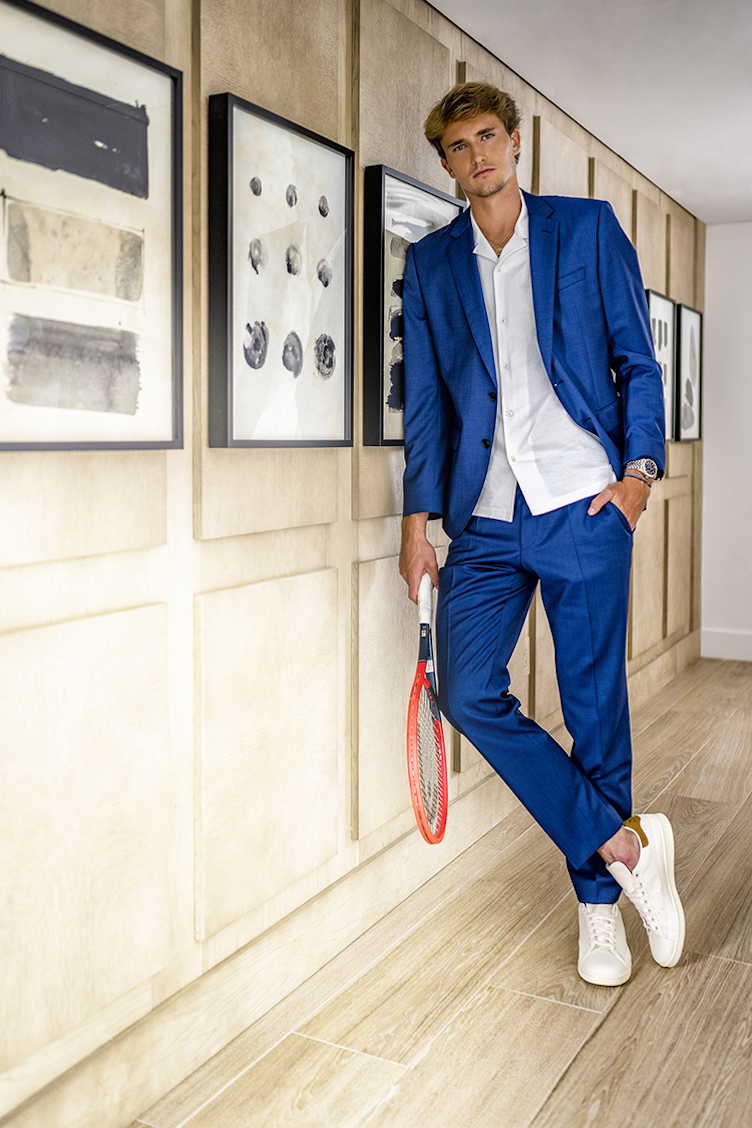
PANTS + SHIRT: BOSS
WATCH: Rolex
SHOES: Adidas
Photo Credit: Nick Garcia
IT’S A RARE MOMENT for Alexander Zverev: a break. He has the month off, and so, to recharge, reset, and prepare for his global domination, he and a slew of friends are heading to the Maldives for sun, fun, and relaxation. Not necessarily in that order.
“It’s nice to get away from everyone after playing for 11 months,” he admits. “I’m going to a place where you literally do not see anybody that you don’t want to see. It’s the perfect place for me to get the energy back.”
Obviously, as close as he is to them, his ATP buddies are not enjoying that island life. But sadly, neither is Miami Heat star Jimmy Butler, also a ride-or-die member of his crew.
“It’s funny because we’re very similar in very different sports and in many other ways, too. He’s somebody who loves to prove people wrong, who doesn’t trust a lot of people as well. We get along great.”
After meeting at Wimbledon, they became fast friends and bonded over their mutual athleticism and love of Miami, among other things. Nights at Casa Butler are among Zverev’s favorites — even when the cards come out. Or maybe especially when they do.
“What we like to do is drink wine, play cards, play dominoes — all kinds of games — and bet on them. That’s the kind of night we’re going to have. We’re going to open a nice bottle of wine, have a great group of guys around us, and play cards basically until 3 a.m. And on those nights I’ll basically lose a ton of money.”
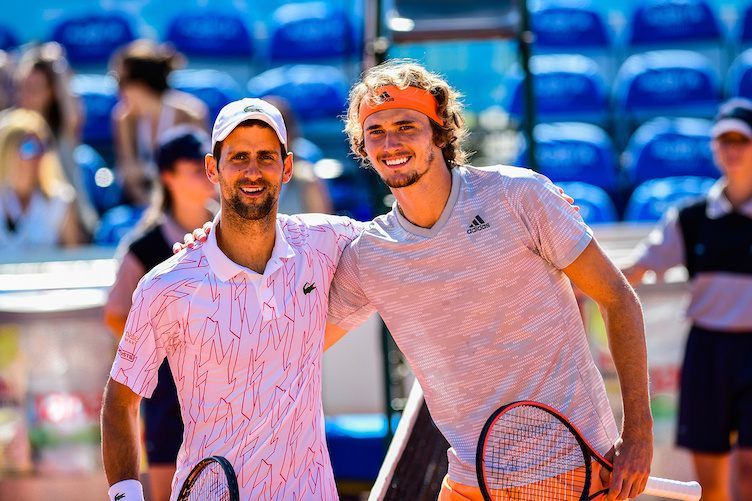
Photo Credit: FOTOSR52/SHUTTERSTOCK.COM
Come again? “I lose most of the time to him, to be fair,” Zverev says with a laugh. “Also to be fair, most of the time, we play his weird card games that I’ve never heard of before. Every second or third round, there’s a new rule coming. So I’ll think I won the game, but I didn’t. He has his ways of taking money from me. He’ll invite me to his house, so it’s his house rules and he just needs somebody to lose money to him, so I’m the guy.” Zverev talks about his losses with laughter and wide, cheeky grins. I would bet my own money that he literally does not care; to him, the money is chump change. Because, like Butler, who has a massive contract with Tag Heuer, Zverev is part of the Rolex family. Neither is hurting financially.
He announced the deal in June, joining fellow players like Federer, Thiem, Jannik Sinner, Stefanos Tsitsipas, and Grigor Dimitrov as an ambassador for the Swiss watch brand, which is also the official partner of all four Grand Slams and the ATP Finals.
“Everybody wants a Rolex in their life at least once, right? It’s an iconic watch. From the first money you make, as a guy, you always want to have a Rolex. The company is historic, and aligns itself with all kinds of sports, which I like.”
The first, which he’s been wearing since signing with the brand last summer, is the Sky-Dweller, which displays the time in two zones simultaneously and has an annual calendar. “It’s not the most expensive or the most unique, but it’s the most special to me because it was first,” he says, noting that the timepiece is unique in a way as it is the most complex movement they produce; he also owns a white gold Daytona.
Zverev hasn’t always been a watch guy, but admittedly, he’s still young. He didn’t have the funds to start collecting early, though he recalls his first timepiece — a blue (his favorite color to this day) Swatch Ice Watch — fondly, as he did his first collaboration, a venture with Richard Mille, in 2018.
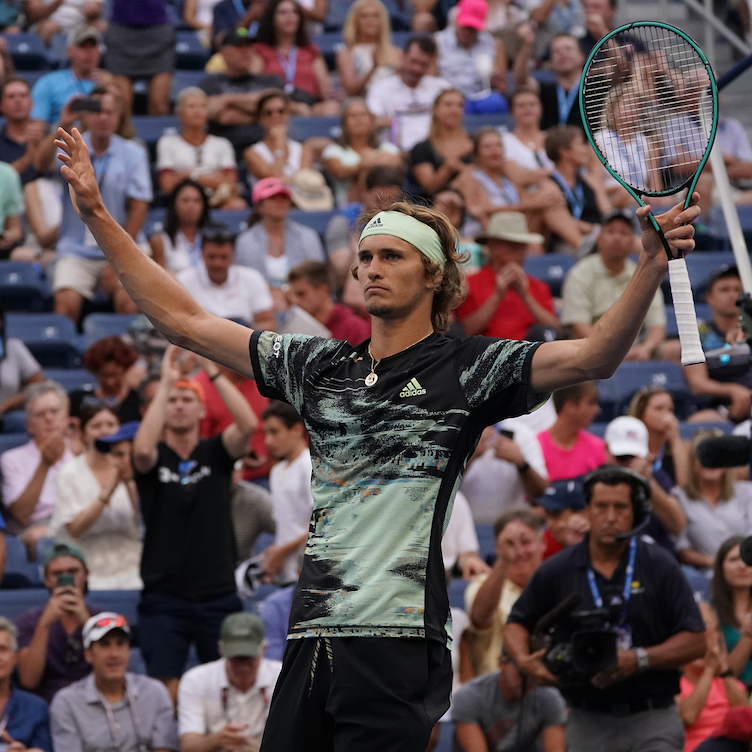
Photo Credit: LEONARD ZHUKOVSKY/SHUTTERSTOCK.COM
But now, oh now… well, once you start collecting, you can’t stop. Plus (and this goes for Rolex in particular) they fit in to his already classy vibe. “I think wearing a watch shows personality. It shows whether you’re a crazy guy — like someone who would wear a diamond-encrusted watch — or a classy guy. By wearing a watch, you see who a man is. You can read the man by his watch and by his clothes,” he says. [For reference, Zverev abhors anything baggy and feels the most swagger in Giorgio Armani and Zegna.]
And by his cars, too. “I’m very big on cars. I enjoy driving them. I enjoy looking at them. I enjoy the feeling of having a nice car,” he says rapturously. He’ll have four as of this month: two BMW i8s, trophies from tournaments won in Munich; a Lamborghini Aventador SVJ; and an Alpine, also a souvenir trophy, from Cologne, on the way.
“I like the thrill of them,” he says. “They’re not particularly comfortable, but oh well.”
In a way, his love of fast whips is akin to the rush he feels when he wins big. “It sounds so silly, but the feeling that you have when you win a massive trophy or a gold medal, it’s the best in the world. Only athletes can understand the satisfaction that you get from that, because your whole life is dedicated to that one goal. The satisfaction of seeing that gold medal in my apartment or just touching it is not just a momentary satisfaction. It shows how hard I’ve been working for the past 20 years of my life, how hard I worked to get it. And I can’t compare that feeling to anything else.”
And yes, he has that validation, but he also knows he has two more steps to go to really reach his goals. But here’s the thing: He’s ready. “I’m motivated. I’m motivated to use every opportunity that I have, because I know that the life I’m living is very limited on time. You cannot do this for 30, 40, 50 years. You can only do it until a certain age. I want to use the time that I have to the maximum. I want to be the best that I can be.”
It’s so fitting that for the man that wears the Sky-Dweller, the sky really is the limit.
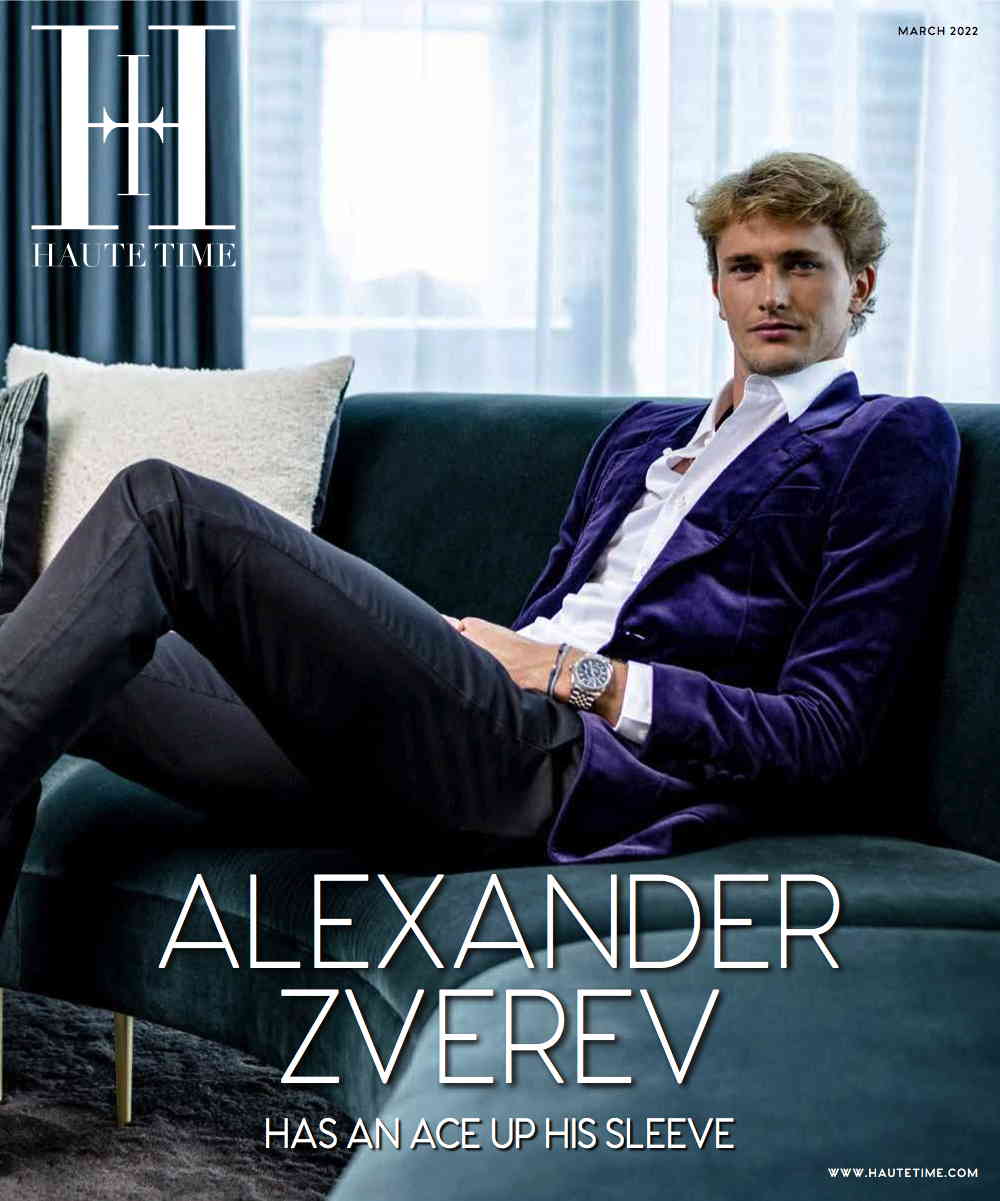
SHIRT + PANTS: BOSS
WATCH: Rolex (own)
Photo Credit: Nick Garcia

